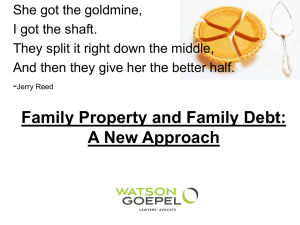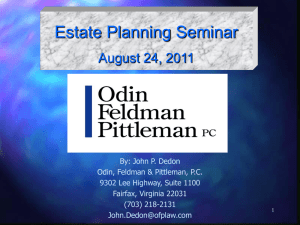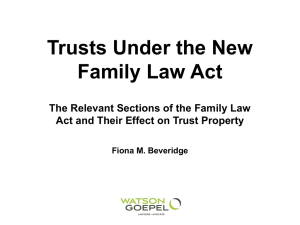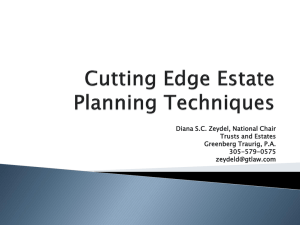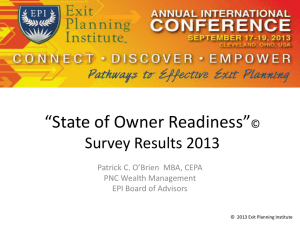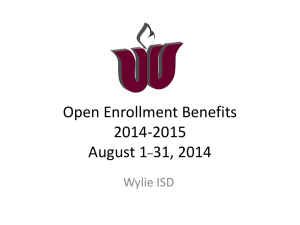Seminar PowerPoint
advertisement
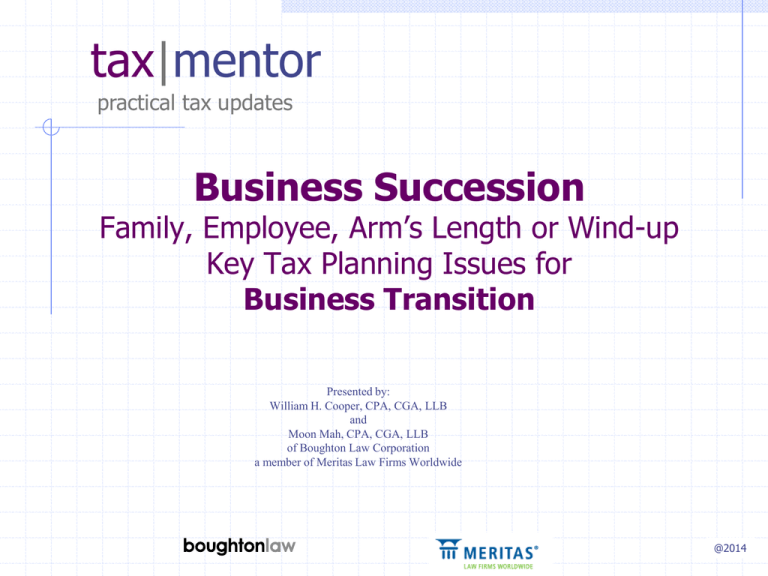
tax|mentor practical tax updates Business Succession Family, Employee, Arm’s Length or Wind-up Key Tax Planning Issues for Business Transition Presented by: William H. Cooper, CPA, CGA, LLB and Moon Mah, CPA, CGA, LLB of Boughton Law Corporation a member of Meritas Law Firms Worldwide @2014 ©2010 Business Succession - Transition Table of Contents • The Will • Planning Considerations • New Wills, Estates and Succession Act (“WESA”) • Intestate Succession: Pre and Post • • • • WESA Multiple Wills Succession Plan: Family Transition Use of Trusts in Planning Family Law Act • • • • Who, when, what… Trust Interest Problem Timing Changes Agreements • Tax/Legal Transition Issues • • • • • • • • • • • • • Identifying Transition Options Business Wind-up Transition Family Business Transition Employee Transition Arm’s Length Sale Transition Wills Business Split Up AETs and JSTs CGE and CGE Qualified Shares Holdco Spin Off Estate Freeze Wasting Freeze Other – SHA’s and Misc Tax Issues @2014 ©2010 The Will • • • • • Is it current? Do a family tree Identify who has specific talents, needs or issues Does the Will work, given the present circumstances? Update and/or consider additional options @2014 ©2010 Planning Considerations • • • • • Is the family situation stable? Is the spouse provided for? Who are the potential heirs? Do any of them have issues? (bad marriage, spending habits, addictions) Does the Will deal with the business? Can multiple Wills help? @2014 ©2010 New Wills Estates And Succession Act (“WESA”) • • • • • Came into effect March 31, 2014 Changes to Wills drafting - terminology No change to Wills Variation Potential for more litigation: courts able to “fix” errors in the formalities Very little that impacts existing Wills BUT major changes if there is no Will @2014 ©2010 Intestate Succession: Pre WESA • • • • No children: all to spouse Spouse and one child: $65,000 to spouse, rest split equally Spouse and more children: $65,000 to spouse, 1/3 of balance to spouse, rest to kids Spouse gets a life interest in the “spousal home” @2014 ©2010 Intestate Succession: WESA • • • • • No children: all to spouse Spouse is entitled to $300,000 if all kids are shared with the deceased Spouse gets only $150,000 if the deceased’s kids are from another relationship Spouse and kids share all the rest 50/50 No life interest in the “spousal home” but spouse has the right to buy it from the estate; may put the preferential entitlement toward that purchase @2014 ©2010 Multiple Wills • • • Separate “probatable” and “non-probatable” assets Deal with assets in different jurisdictions Appoint different executors for business assets and personal assets @2014 ©2010 Succession Plan: Family Transition • • • • • • Is one child more active in the business? How to compensate others? Are the kids in on the planning? Do any have special talents? Do any have unreasonable expectations? How to take advantage of strengths/talents @2014 ©2010 Use of Trusts in Planning • Trusts - avoid problems, such as: • • • • Wills Variation (only applies to estate) Matrimonial Disputes Unreasonable demands of shareholders Dissipation of assets through legal battles, hard feelings @2014 ©2010 Benefits of Inter Vivos Trusts • • • • • • Testamentary vs. Inter Vivos “in a Will” vs. “during life” Inter Vivos Trusts are private documents Assets in a Trust do not form part of the deceased’s estate No need for probate (or probate fees) Cannot be attacked under Wills Variation @2014 ©2010 Use of Inter Vivos Trusts • • • • • Often part of a corporate planning strategy Family Trusts (with an estate freeze) Joint Spousal or Alter Ego Trusts (for those 65 and older) Roll-Overs allow capital gains deferral Consider Family Law Act issue (discretionary trusts) @2014 ©2010 Family Law Act - Who is Affected • • • • • • Legally Married: from the date of marriage Living together for 2 yrs+ (note, can be immediate if the parties have a child together, except under Parts 5 and 6) Inclusion is automatic May “opt out” by agreement Agreements can be made to deal with future events, without binding now @2014 ©2010 FLA - When does Separation Occur? • • • Under the old act, needed a triggering event Now, it’s communication by one spouse to the other, even if they continue to live in the same house Or action by one spouse demonstrating an intention to separate @2014 ©2010 FLA - Part 5 – Property Division • • Equal entitlement and responsibility S. 81 … • • spouses are both entitled to family property and responsible for family debt, regardless of their respective use or contribution, and on separation, each spouse has a right to an undivided half interest in all family property as a tenant in common, and is equally responsible for family debt @2014 ©2010 FLA -What is Family Property? s. 84: family property includes everything, unless specifically excluded (s.85): • that is owned by at least one spouse, or • in which at least one spouse has a beneficial interest; and • after separation, …… if derived from family property @2014 ©2010 FLA -What is Family Property? (cont…) Includes everything: • Acquired during the relationship • Disposed of during the relationship but a spouse retains authority (eg Family Trust settled by a spouse) • Held by a spouse at separation; and • The increase in value of Excluded Property that occurred during the relationship @2014 ©2010 FLA - What is Excluded Property? • • • • • Property acquired before the relationship Gifts, inheritances Certain settlements and damage awards Any of the above held in trust for a spouse Property held in a Discretionary Trust, if: • • • Spouse did not contribute to the trust, Spouse is a beneficiary of the trust, and Someone other than the Spouse settled the trust @2014 ©2010 FLA - What is EXCLUDED? • It is clear that property in a discretionary trust previously was Excluded Property, if: • • • • A spouse did not contribute to it, A spouse is a beneficiary, and The trust was settled by a person other than the spouse A beneficial interest in a trust is also Excluded Property if owned before the relationship started @2014 ©2010 FLA - Trust Interest Problem • • • In either case, the increase in value of Excluded Property during the relationship is Family Property Problem fixed? Now only the discretionary interest in the Trust is Excluded Property – not the increase in value of property in the trust Problem fixed – Bill 14 Justice Statues Amending Act – OIC 23/5/14 @2014 ©2010 FLA – Timing Changes Important dates will change • Presumptive Equal Division: • • • • At “end of the relationship” Valuation of Family Property by agreement or at date of a hearing Increased value since date of marriage or start of cohabitation NOTE: for non-married spouses the date is retroactive to the date they started cohabiting, not the 2 year anniversary that actually brings them under the Act @2014 ©2010 Family Law Agreements • • • • Useful to create certainty Should be a pre-requisite to share ownership Build into the family trust: no beneficial interest unless an agreement is in place Family Law Act creates an issue that can be mitigated by an Agreement @2014 ©2010 Identifying Transition Options • The Business Wind-up Transition • • unsaleable and no family successor The Family Transition • • viable business with qualified family successor The Employee Buy-Out • • strong business - financeable - involved employees The Arm’s Length Sale • viable stand alone business @2014 ©2010 Business Wind-up Transition • • • • • Operating businesses phase out due to obsolescence or loss of market share - issue is loss of “active status” Dying business with significant business real estate? Candidate to crystallize Capital Gains Exemption (“CGE”) while business still active? By crystallizing- in effect purchasing a lifetime life insurance policy Project tax liability on death and the estate’s ability to pay – consider life insurance and use of CDA @2014 ©2010 Family Business Transition • Next generation up to the task of managing business? Identifying a Suitable Family Successor – consider: • • • • • • stability of marriages - competition between siblings family member with interest and ability to run business Competing siblings – consider business split up while under parents’ control – avoid s.55 post death of survivor Spin-off of redundant or investment/cash assets to investment/holding company Separate passive retirement assets Consider estate freeze and multiplication of CGE @2014 ©2010 Employee Transition • Limited market – good if no logical arm’s length buyer • • • • • e.g. construction businesses not saleable except to insiders Start early in developing key employees Long term planning required to effect this option – consider ESOPs and SARs – “golden hand cuffs” – tie in with bonus program – arm’s length minority shareholdings bad - be careful - s.7 options do not yield CGE! Get key employees under contract and incentivized with bonuses and equity participation Be careful creating minority share position - need SHA @2014 ©2010 Arm’s Length Sale Transition • Typically only available for mature businesses where the business “runs itself” • • If not then arm’s length sale unlikely – or value depressed Are key arrangements legally documented • • • • key employees under contract? if employees are writing software code have they assigned the copyright to the company? leases in place to protect operating facilities, etc. Does business run itself without regular contact with owner-manager? • Few private businesses ever make it to this level – many clients have unrealistic view of business’ value! @2014 ©2010 Tax / Legal Transition Issues • If a family member has been identified as the likely successor, do principals’ Wills permit the transfer • • • successor family owners often have little interest in working for the benefit of siblings - consider alternatives to balance estate financial advisors need to be family councillors – this stage requires some difficult decision making by the principal If two or more potential sibling successors - consider split of Opco into separate operating entities • • must be done well before death of surviving parent to avoid taxable spin off – s.55 Consider spin off of investments to siblings not involved in business to balance Opco transition to a single child @2014 ©2010 Tax / Legal Transition Issues • Is there significant family discord – with possible challenge of Will? – consider Alter Ego / Joint Spousal Trust option in place of a will at age 65 • • • • • not just to avoid Estate Duties avoid Wills Variation claims - implement the Will NOW avoids public disclosure of holdings under Will probate filing separate businesses operations and/or investment activities into separate entities - so kids don’t have to deal with each other if achieved during lifetime of principals this avoids family discord and s. 55 butterfly problems on a non-pro rata distribution which would arise when parents are gone @2014 ©2010 Tax / Legal Transition Issues • CGE and qualified shares - most successful Opcos don’t qualify for CGE – now $800,000 per “individual” indexed CGE was designed to encourage creation of new businesses • • • most successful Opcos don’t qualify due to passive investment of excess cash flow taxed at low SBD rate Plan well in advance - ensure company meets 24 month - 50% - and time of sale - 10% active business asset tests Options to insure access to CGE include (discussed below): • • • • Purify and crystallization Holdco spinoff of non-essential business assets Estate Freeze with Family Trust and Holdco Beneficiary @2014 ©2010 Tax / Legal Transition Issues • Crystallize CGE by triggering disposition: • • • • • • internal S.85 – swap common shares for prefs and elect into a taxable gain – claim CGE – better that Holdco roll roll common shares to Holdco and elect a gain – bad choice – CGE ACB trapped – many crystallizations in early 90’s flawed Watch out for Minimum Tax, ABIL and CNIL balances May need to pay a “cleansing” bonus or dividend first A dying business with significant operating real estate holdings should crystallize to cover value of RE prior to loss of qualified small business corporation share status Avoid need for separate holding/investment company @2014 ©2010 Tax / Legal Transition Issues • Holdco spin out - alternatively get Opco set up with Holdco to permit tax deferred removal of investments assets and excess cash flow • • • • • should be considered where there are no substantial outstanding creditor claims isolates investment assets from liability issues inherent in business operations requires “freeze” of share capital of Opco Holdco spin out lets kids run business during parents lifetime with no risk to parent/principals “pension assets” Restricts Opco to value of active business – facilitates sale @2014 ©2010 Tax / Legal Transition Issues • Estate Freeze /Family Trust Option • • • • • If value of Opco exceeds available CGEs (say $1.6 mil for husband and wife), issue new common shares post freeze to Family (inter vivos) Trust Same benefits a Holdco spin off but shifts value of Opco to next generation - only use if parents have sufficient assets to live on Reduces tax on death of surviving parent - gives estate and next generation more flexibility and financial options Permits multiplication of CGE on growth shares 21 year deferral of capital gains recognition - works best with a SHA in place where there are multiple kids as shareholders @2014 ©2010 Tax / Legal Transition Issues • Consider wasting freeze of Prefs arising on Crystallization or Holdco Spin off Freeze • • • if parents have more assets to live on than they need – stop paying wages or dividends and use those funds to repurchase the freeze shares – “kill two birds with one stone” - eliminate the gain inherent in freeze prefs while distributing owner compensation if it is timed right there may be no taxable capital gain on the death of the surviving parent Minimal current tax impact for an investment company earning income subject to RDTOH @2014 ©2010 Tax / Legal Transition Issues • Existing Family Trust? • • • • • • make sure Opco onside the QSBC Share test review for 21 year deadline and determine timing and strategy for Trust wind up – consider tax deferred roll out of Trust assets to beneficiaries roll out of assets or roll down to Holdco and roll out shares? make sure beneficiaries have not moved to US or ceased to be resident Make sure as to status of Trustees – alive? – still resident in Canada? Consider impact of new BC FLA when establishing the Family Trust as it may create an interest in Trust’s assets (shares of family company) in the departing spouse of a child who is a named beneficiary of a discretionary Family Trust @2014 ©2010 Tax / Legal Transition Issues • Family Shareholders Agreement an essential if more than one child to retain ownership of family operating company • • • parents should consider implementing a Family Shareholders’ Agreement (SHA) - a road map on how to run the family business in terms of profit sharing and share ownership have a family meeting to discuss parents’ wishes - include kids but don’t plan on any unanimous agreement implement SHA at the time of the estate freeze and settling of a Family Trust @2014 ©2010 Tax / Legal Transition Issues Other Miscellaneous Issues • • • • Consider S. 84.1 which can convert capital gain to deemed taxable dividend Consider application of “designated person” attribution rules (s.74.4) when effecting an estate freeze and the creation of an investment Holdco – double tax potential Consider Part IV tax and Part VI.1 tax on any Holdco spin off and cross-redemption of shares leading to intercorporate dividends made non-taxable by the s. 112(1) deduction Consider s.55 which turns tax free inter-corporate dividends into taxable capital gains @2014 ©2010 tax|mentor practical tax updates Thank - you Business Succession - Family, Employee, Arm’s Length or Wind-up - Key Tax Planning Issues for Business Transition @2014 ©2010

